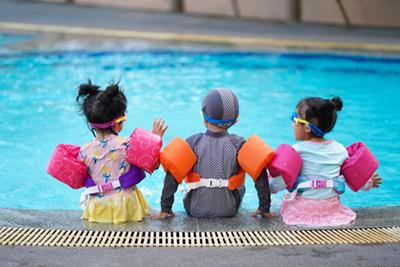Pool Safety: Preventing Drowning and Water-Related Accidents

- posted: Jul. 18, 2024
As the weather starts to get nicer and summer approaches, pools become popular spots for fun and relaxation. However, ensuring safety around the water is paramount to prevent drowning and water-related accidents. It’s important to understand pool safety and how to keep your child safe from serious accidents. Your family medicine doctors at Primary Care Partners in Northern and Central New Jersey can explain pool safety and how to help your child enjoy water without the risk of drowning.
Understanding Pool Safety
It’s important to practice pool safety and help your child understand that while going to the pool is fun, it’s important to take precautions. Your child should understand the rules of the pool and know how to enjoy the pool while still being safe.
Never leave children unattended near water. Designate a responsible adult to watch swimmers at all times, avoiding distractions like phones or books. Even experienced swimmers can encounter difficulties, so vigilant supervision is crucial. Install safety barriers such as fences, gates, and alarms around the pool area. Ensure that gates are self-closing and self-latching, with latches out of children's reach. These measures can prevent unsupervised access to the pool.
Knowing how to perform CPR can be lifesaving in emergencies. You may want to take a CPR course and ensure other family members or frequent pool users are also trained. Quick action can make a significant difference in outcomes during water-related accidents.
Enroll children and adults in swimming lessons to improve their water competency. Knowing how to swim can significantly reduce the risk of drowning. However, even skilled swimmers should be aware of water safety rules and not overestimate their abilities.
Ensure that non-swimmers and young children wear properly fitted life jackets. Floatation devices like water wings or pool noodles are not substitutes for life jackets and should not be relied upon for safety.
Set and enforce pool rules, such as no running, no diving in shallow areas, and no swimming without an adult present. Clearly communicate these rules to all swimmers and guests to ensure everyone understands the importance of safety.
Contact Our Doctor Today
Make sure you’re enjoying the pool while still practicing safely. Contact family medicine doctors at Primary Care Partners in Northern and Central New Jersey to learn about pool safety.

- posted: Jul. 18, 2024
As the weather starts to get nicer and summer approaches, pools become popular spots for fun and relaxation. However, ensuring safety around the water is paramount to prevent drowning and water-related accidents. It’s important to understand pool safety and how to keep your child safe from serious accidents. Your family medicine doctors at Primary Care Partners in Northern and Central New Jersey can explain pool safety and how to help your child enjoy water without the risk of drowning.
Understanding Pool Safety
It’s important to practice pool safety and help your child understand that while going to the pool is fun, it’s important to take precautions. Your child should understand the rules of the pool and know how to enjoy the pool while still being safe.
Never leave children unattended near water. Designate a responsible adult to watch swimmers at all times, avoiding distractions like phones or books. Even experienced swimmers can encounter difficulties, so vigilant supervision is crucial. Install safety barriers such as fences, gates, and alarms around the pool area. Ensure that gates are self-closing and self-latching, with latches out of children's reach. These measures can prevent unsupervised access to the pool.
Knowing how to perform CPR can be lifesaving in emergencies. You may want to take a CPR course and ensure other family members or frequent pool users are also trained. Quick action can make a significant difference in outcomes during water-related accidents.
Enroll children and adults in swimming lessons to improve their water competency. Knowing how to swim can significantly reduce the risk of drowning. However, even skilled swimmers should be aware of water safety rules and not overestimate their abilities.
Ensure that non-swimmers and young children wear properly fitted life jackets. Floatation devices like water wings or pool noodles are not substitutes for life jackets and should not be relied upon for safety.
Set and enforce pool rules, such as no running, no diving in shallow areas, and no swimming without an adult present. Clearly communicate these rules to all swimmers and guests to ensure everyone understands the importance of safety.
Contact Our Doctor Today
Make sure you’re enjoying the pool while still practicing safely. Contact family medicine doctors at Primary Care Partners in Northern and Central New Jersey to learn about pool safety.
